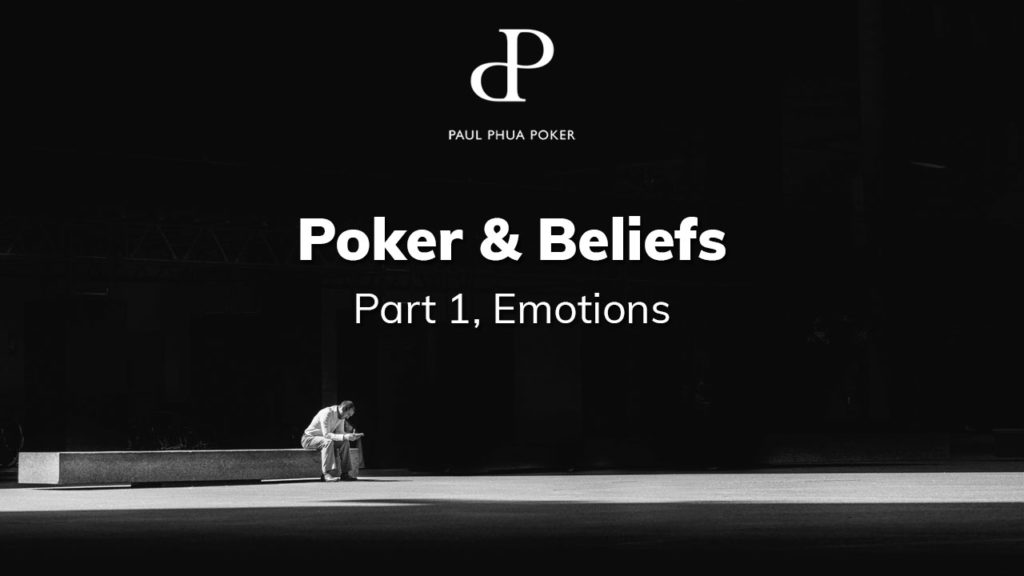
Phil Galfond is one of the most magnificent men ever to play high stakes No-Limit Hold’em (NLHE) and Pot-Limit Omaha (PLO) cash games in the online realm.
The 3-time World Series of Poker (WSOP) bracelet winner is currently locked in a series of heads-up challenges that have grabbed the attention of the poker industry.
Galfond challenged 7.5 billion people, and so that doesn’t inspire a caricature of a wide-socketed expression of fear. Galfond isn’t a man who hides in the back alleys and shadows. He is a man who stands on the stage, front and centre.
Still, during an interview with The Chip Race mobsters Dave Lappin and Dara O’Kearney, Galfond spoke candidly of his fear of failure admitting that he believes he questions his ability and standing in the high stakes strata more than anyone else in that seam.
There wasn’t a hint of bloated admiration for his ability. Instead, in a show of humility rare in a game heavily saturated in status posturing, Galfond told the Irishmen that he tends to give up on things for the wrong reasons.
It’s a part of Galfond’s makeup that stems from his childhood.
“In school, I wouldn’t do any of my work,” said Galfond. “I was used to doing things without trying. Then, when the work got harder, I refused to try. I was afraid to try. I had this image in my mind that I was smart, and I didn’t want to spoil it by failing.
“It’s the same with solvers in poker. What if I study them, and I’m unable to apply any of the concepts to my game? I don’t want to find out that if I can’t learn these things, I won’t be at the top of my game.”
How does this happen to a man battling the best players in the world for millions of dollars?
Post-mortem points to Galfond’s belief system.
Two Worlds
Each of us, from the poker player to the painter to the overweight potato peeler, exist in two worlds.
The first is our external world.
Our bedroom. Our home. Our street. Our neighbourhood. Our county. Our country. Our continent. Our world. Our universe or our dimension or our patch of megabytes in the game of life.
The second is our inner world.
It’s the place where we recite books without moving our lips. The place where arguments take place between good and evil. The home of our thoughts, our feelings, our emotions – our beliefs.
Childhood
Research suggests that our core identity, personality, character, call it what you will, forms early in our childhood. Our nerve-based learning system howls from the suffocating darkness of our minds, desperate to delve into the glory and glamour of cause and effect.
The external world shapes our inner world through advertising, marketing and brainwashing. The most impressive of these mass marketers are the walking, talking billboards we call “mum” and “dad”, and this most malleable of moments becomes even more entombed in our psyche when we join the school.
Yesterday, I picked my 3-year-old daughter, Zia, up from pre-school. Sad, and melancholy, Zia stood on the periphery of the after school playtime period. Later, in the car, I asked how she felt.
“Sad.”
“Did something make you feel sad in school?”
“Yes.”
“Did someone make you feel sad?”
“Yes.”
“Who?”
“Michelle.”
“How did Michelle make you feel sad?”
“She said that I was too small to play with her.”
As innocent as that sounds, if my wife and I, or her teachers, don’t help her navigate these feelings – and if this feedback continues as she develops – then she will create a belief that being small equates to a lack of acceptance.
Zia wants approval from her friend. We have to teach her that this isn’t the way to receive love and acceptance.
This conditioning exists in all of us, even world-class poker players.
The Action Ladder
Imagine you’re in a juicy cash game, and everything is going wrong. It’s one of those sessions that leave too many strands of hair in the bathtub after a shower.
After losing hand after hand, you lose control. You’re no longer making decisions based on logic. Your feelings have garrotted them. The whole experience has turned into a macabre melody, and you’re its composer.
It’s natural to blame the crime on your external world. Maybe the environment, the deck or the people in and around the game. All of these things affect your moment of temporary madness. Because of this, and the nature of Resistance, you’ll conveniently overlook the more pressing matter – the impact of your inner world.
If at the end of the game we scan a page of emotions, looking for descriptives of our current state of feeling, we may cut and paste words such as anger, frustration, inadequacy, and emasculation.
While there’s no doubt that you have these feelings, it’s critical to understand that your external world is not responsible for the emergence of them – your inner world is.
The dealer can’t make you angry.
The deck can’t cause frustration.
Your opponents can’t make you feel inadequate.
Poker can’t emasculate you.
Most of us want to live a fulfilled and joyful life. It’s the biological goal for the vast majority of humans. Yet, the poker world is a minefield, because the very fabric of existence rests on disappointment after disappointment interrupted by the occasional moment of magic.
If you want fulfilment and joy, then you can choose more accessible routes than bursting through the poker bubble. Still, if you’re going to take the red pill, and see how far poker’s rabbit hole goes, then you have to address the internal cause of your unhappiness.
The Divorce
A decade ago, I took the brave step of leaving my 19-year career on the railway to become a professional poker player. A few months, after my early retirement, my wife of 15-years asked for a divorce.
The split became amicable.
We both left with vats of love for each other and gallons of respect.
Over the years, as we both moved on, we reacted and behaved differently when it came to the management of the pain, suffering and grief traced to the parenting of our only child.
The bloodiest battles lasted a good six years, and there are still battles to this day, a decade after the split.
If external factors were the cause of our disharmonious separation, then we both would have behaved similarly. Instead, we acted directly opposite each other because our perception of the events surrounding the divorce came from two different internal worlds.
When my ex-wife became angry at me for missing ‘my weekend’ with my son because I was in Barcelona working at a poker tour, and texted to tell me that ‘I was the worst father in the world’. That action came from a feeling, that emerged from a thought stuck on the hook belonging to a line called ‘beliefs.’
Her belief that fathers should drop everything, and put their children first, drove the thought that I was a terrible father, that drove the feelings of anger that led to the text. I had a belief that a father should take care of himself so he can become a better parent.
Beliefs – Thoughts – Feelings – Actions.
Validation
If we get caught in the mandible of external factor blame, then we ignore the internal belief system that creates the foundation of our experience.
For some, shining the light on our belief systems is a painful business. Each ray results in a parlay of pike and piranha pricks, and so our Resistance (our ego), emphasises external factors, thus preventing the lantern from ever entering the cave.
Resistance has many tactics that allow us to continue biting the lip instead of figuring things out. One of them is to seek validation from others, accentuating our justifications for continuing the behaviour and pushing the thought of dealing with our beliefs further and further away from the thorough examination it needs.
So we ask our mother, “What do you think of Lee! Travelling around the world, leaving his son at home.”
And the mother responds, “That’s terrible. What a horrible man. I never thought he would become ‘one of them.’ Poor you. Poor boy.”
Friends and family, act as authorities, validating our beliefs through best buddy bias. The same happens in poker with people validating plays, behaviours and actions. It takes a person of a particular awareness to notice the inconsistency between internal and external worlds, and a lot of courage to speak up. Often, when you find a world-class poker player, they are surrounded by these types of people.
The Never-Ending Story
Many people never get over painful experiences like divorces or suffering more bad beats than Ace of Base. Many people never manage to control their emotions effectively. Instead, preferring to believe the Poker Gods have it in for them and refusing to do the work necessary to dissolve these delusions.
Still, with awareness and practice, people can learn to recognise when an unhealthy belief system is producing thoughts, emotions and actions that are ending in a logjam of pain and misery.
Mindworks author, Gary van Warmerdam, calls this learning – mastery of our emotions, and I aim to touch upon some of his ideas and principles throughout this series.
The inspiration behind this series comes from the book Mindworks: A Practical Guide for Changing Thoughts, Beliefs and Emotional Reactions by Gary van Warmerdam.
https://pathwaytohappiness.com/about/gary-van-warmerdam/




